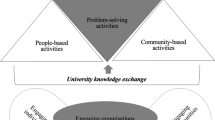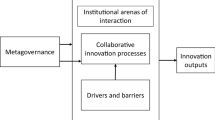Abstract
Debates about the role of the university in society have been going on for many decades. There have been several calls for a more “engaged” form of scholarship which applies itself consciously to the pursuit of applied knowledge which can contribute towards solving some of the most pressing societal challenges. Closer collaboration between universities and community groups has been identified as a central component of this form of scholarship. This paper interrogates the literature on the role of universities in society, with a specific focus on university-community partnerships, and discusses the experience of the Philippi CityLab in Cape Town, South Africa to shed some light on the complexities, challenges and rewards of university-community interactions. The case of the Philippi CityLab confirms many of the pre-requisites for “successful” collaboration between universities and communities as identified in the literature. The paper argues that the ideal of a more engaged scholarship is certainly worth pursuing and that there is no doubt that South African universities do have a role to play in terms of working with communities to find workable solutions to the myriad of development challenges which they face. However, the experience of the Philippi CityLab also shows that stakeholders should not be naïve about the time, effort and investment which these kinds of engagements require and the difficulty of establishing, maintaining and sustaining genuine, mutually beneficial university-community collaborations. Furthermore, a truly engaged scholarship requires a significant transformation of the institutional context within universities in order to not only facilitate and support, but also reward research which seek closer collaboration between universities and communities.

Similar content being viewed by others
Notes
African Centre for Cities “Integrated Sustainable Human Settlements Research/CityLab Concept Note, February 2008 and Overview of the African Centre for Cities” CityLab, 4 October 2010.
Service-learning requires university students to participate in community projects in exchange for course credits.
The Cape Flats consist of a number of township areas in Cape Town established during Apartheid as a result of forced removals of black and coloured people from areas designated for the white population.
For a more detailed account of the historical development of Philippi, see Adlard (2008) “An introduction to Philippi”. Unpublished paper.
See Anderson (2009) “Philippi Community Profile—Final Report”, South African Education and Environment Project (SAEP) and Erasmus and Mans (2005) “Philippi Transformation Research Project” The Unit for Religion and Development Research and Transformation Africa, University of Stellenbosch, South Africa for a detailed demographic profile of Philippi.
The Urban Matters programme was initiated in 2008 as an initiative of Catholic Organisation for Relief and Development Aid (CORDAID) and Philippi was identified as the core focus of the programme. Urban Matters uses a multi-stakeholder collaborative approach to neighbourhood development in order to develop innovative, replicable and practical shared solutions to address infrastructural and social issues in poor neighbourhoods. The Urban Matters initiative was also implemented in Kisumu, Kenya and San Salvador in El Salvador.
Samora Machel is an area in Philippi.
References
Adlard, G. (2008). An Introduction to Philippi. Unpublished paper.
Anderson, V., et al. (2009). Philippi community profile—final report. South African Education and Environment Project (SAEP).
Baum, H. S. (2000). Fantasies and realities in university-community partnerships. Journal of Planning Education and Research, 20, 234–246.
Bender, G. (2008). Exploring conceptual models for community engagement at higher education institutions in South Africa. Perspectives in Education, 26(1), 81–95.
Boyer, E. L. (1990). Scholarship reconsidered: Priorities of the Professorate. New Jersey: The Carnegie Foundation for the Advancement of Teaching.
Boyer, E. L. (1996). The scholarship of engagement. Bulletin of the American Academy of Arts and Sciences, 49(7), 18–33.
Bringle, R. G., & Hatcher, J. A. (2002). Campus community partnerships: The terms of engagement. Journal of Social Issues, 58(3), 503–516.
Checkoway, B. (1991). Unanswered questions about public service in the public research university. Journal of Planning Literature, 5(3), 219–225.
Checkoway, B. (1997). Reinventing the research university for pubic service. Journal of Planning Literature, 11(3), 307–319.
Checkoway, B (2000). Public service: our new mission. Academe Online.
Checkoway, B. (2001). Renewing the civic mission of the American research university. Journal of Higher Education, 72(2), 125–147. (Special Issue: The Social Role of Higher Education).
Creighton, S. J (2006). Community partner indicators of engagement: an action research study on campus-community partnership. Unpublished PhD thesis.
Davies, C. A. (1999). Reflexive ethnography: A guide to researching selves and others. Routledge: New York.
Dewar, M. E., & Isaac, C. B. (1998). Learning from difference: the potentially transforming experience of community-university collaboration. Journal of Planning Education and Research, 17, 334.
Erasmus, J., & Mans, G. (2005). Philippi transformation research project. The Unit for Religion and Development Research and Transformation Africa, University of Stellenbosch, South Africa.
Etherington, K. (2004). Heuristic research as a vehicle for personal and professional development. Counselling and Psychotherapy Research: Linking research with Practice, 4(2), 48–63.
Gibbons, M. (2000). Context-sensitive Science—Mode 2 society and the emergence of context-sensitive science. Science and Public Policy, 27(3), 159–163.
Greenaway, L. (2010). Reflexivity: the researcher’s voice in qualitative research. http://www.evaluationservices.co.uk/43/Reflexivity-the-researcher039s-voice-qualitative-research.
Hasselkus, B. R. (2003). The voices of qualitative researchers: sharing the conversation. The American Journal of Occupational Therapy, 57(1), 7–8.
Jansen, J. D. (2002). Mode 2 knowledge and institutional life: Taking gibbons on a walk through a South African University. Higher Education, 43, 507–521.
Marullo, S., & Edwards, B. (2000). From charity to justice: The potential of university-community collaboration for social change. American Behavioural Scientist, 43, 895–912.
Maurrasse, D. J. (2002). Higher education-community partnerships: Assessing progress in the field. Non-profit and Voluntary Sector Quarterly, 31(1), 131–139.
Mayfield, L., et al. (1999). The Chicago response to urban problems: Building university-community collaborations. American Behavioural Scientist, 42, 863–875.
McMillan, J. (2009). Illuminating transaction spaces in higher education: service learning, boundary work and boundary workers. Paper presented at the Knowledge and Curriculum in Higher Education Symposium, 29–30 June 2009, University of Cape Town.
Oldfield, S. (2008). Who’s serving whom? Partners, process, and products in service learning projects in South African geography. Journal of Geography in Higher Education, 32(2), 269–285.
Ostrander, S. A. (2004). Democracy, civic participation and the university: A comparative study of civic engagement on five campuses. Non-profit and Voluntary Sector Quarterly, 33, 74–93.
Pillow, W. S. (2003). Confessions, catharsis or cure? Rethinking the uses of reflexivity as methodological power in qualitative research. Qualitative studies in Education, 16(2), 175–196.
Schon, D. A. (1995). Knowing-in-action: The new scholarship requires a new epistemology. Change, 27(6), 27–34.
Waghid, Y. (2002). Knowledge production and higher education transformation in South Africa: Towards reflexivity in university teaching, research and community service. Higher Education, 43, 457–488.
Winberg, C. (2006). Undisciplining knowledge production: Development driven higher education in South Africa. Higher Education, 51, 159–172.
Acknowledgments
This article is based on work undertaken as part of the work of the Philippi CityLab, which forms part of the CityLab programme of the African Centre for Cities at the University of Cape Town. The African Centre for Cities’ CityLab programme is funded through the Mistra Urban Futures network (which is funded by Mistra the Foundation for Strategic Environmental Research and the Swedish International Development Cooperation Agency), the Provincial Government of the Western Cape (Department of Human Settlements) and the City of Cape Town.
Author information
Authors and Affiliations
Corresponding author
Rights and permissions
About this article
Cite this article
Brown-Luthango, M. Community-university engagement: the Philippi CityLab in Cape Town and the challenge of collaboration across boundaries. High Educ 65, 309–324 (2013). https://doi.org/10.1007/s10734-012-9546-z
Published:
Issue Date:
DOI: https://doi.org/10.1007/s10734-012-9546-z




